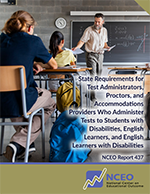To help ensure that assessments are properly administered, states have developed policies about who can administer or proctor assessments and the training they must have. Similarly, states have policies regarding who can provide accommodations to help ensure that the accommodations are provided appropriately. Little is known about these policies. To explore test administration policies as they relate to students with disabilities, English learners, and English learners with disabilities taking general state content assessments, NCEO conducted an analysis of publicly available state policies. The findings are presented in State Requirements for Test Administrators, Proctors, and Accommodations Providers Who Administer Tests to Students with Disabilities, English Learners, and English Learners with Disabilities (NCEO Report #437).
The report found that most states had policies regarding the qualifications or requirements for individuals who could be test administrators, proctors, or accommodations providers. Available policies had significant variation in who could serve in these different roles and in the level of detail included. States were more likely to have policies on test administrators (43 states) compared to proctors (18 states). The policies that did exist did not always address required training for these individuals. Some states’ policies also addressed qualifications and training of accommodations providers such as scribes, test readers, sign language interpreters, and language translators.
Based on the policy analysis, the report provides three recommendations for state education agencies (SEAs):
- Review SEA policies to ensure that they include appropriate information about the required qualifications and training for test administrators, proctors, and accommodations providers, and revise them if needed.
- Ensure that all test administrators, proctors, and accommodations providers receive training on accommodations and how to appropriately administer tests to students with disabilities, English learners, and English learners with disabilities.
- Consider the risks of allowing non-school employees or volunteers to serve as test administrators, proctors, or accommodations providers.

